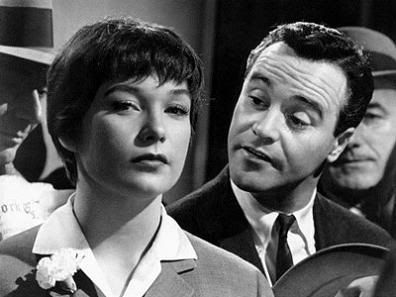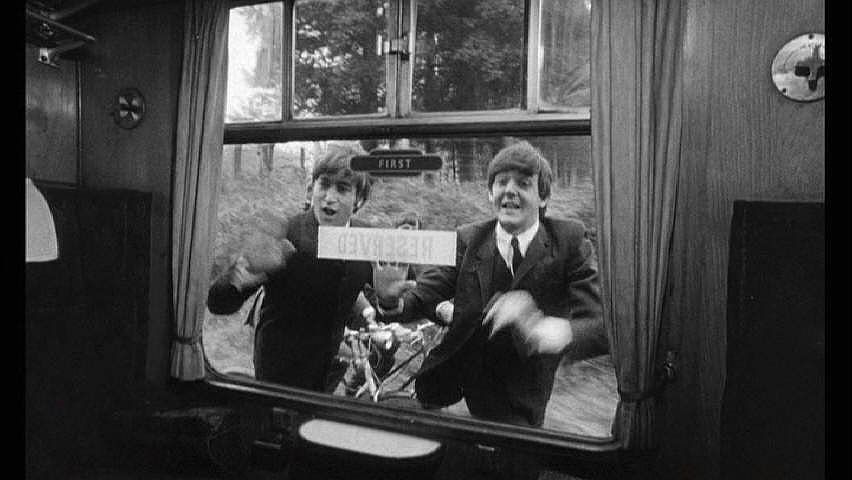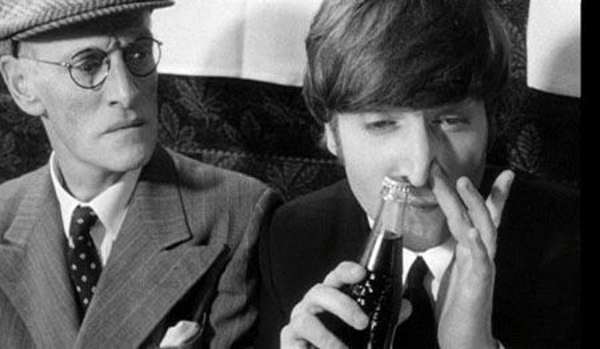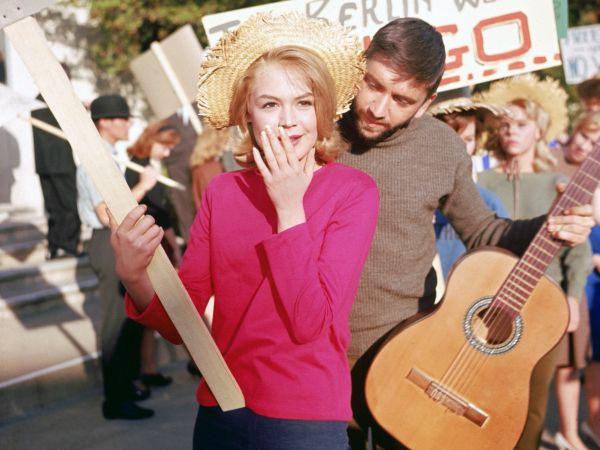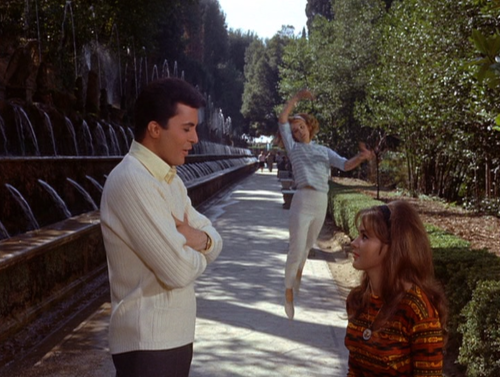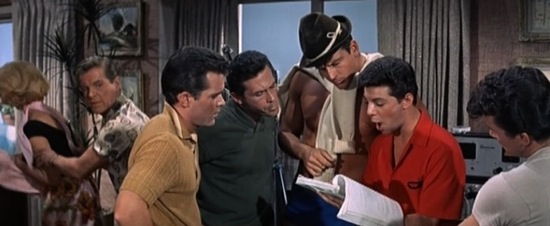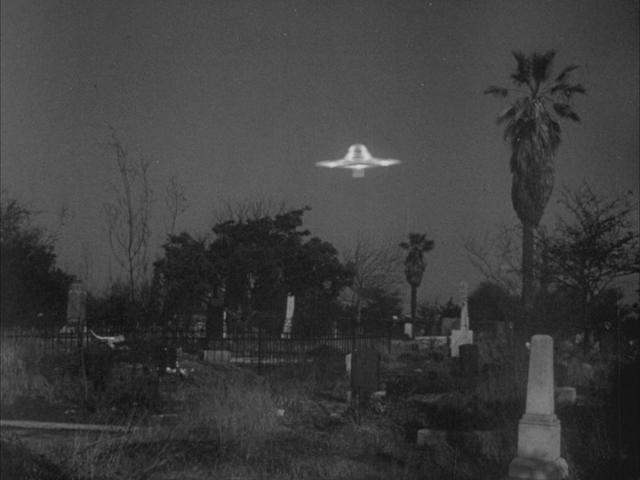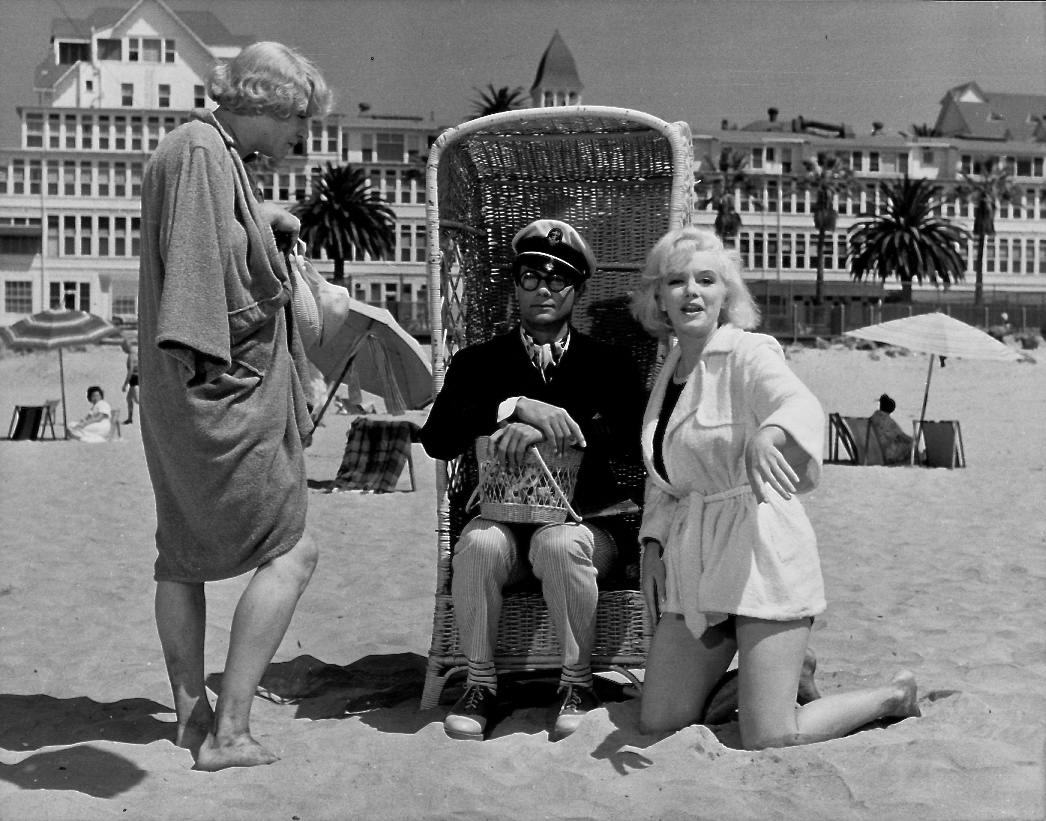The Apartment
June 15, 1960
United Artists
Comedy, Drama, Romance
DVD
B+
Although this has big stars, won five Oscars-- best picture, director, original screenplay, film editing, and set direction-- and has received critical acclaim, then and now, it feels like an obscure little picture. I don't mean that as an insult. It's just that Wilder's use of black & white here, and the feel of a stageplay (much of the film is indeed set in the title location, and the cast is relatively small), as well as the intimate, human tone, suggest a low-budget gem. Yet there are those big stars, and the workplace is huge, with the floor that C.C. Baxter (Jack Lemmon) works on seeming to stretch into infinity. There's another contradiction in the way the genres clash with each other, the comedy, drama, and romance not blending so much as fighting. This works much better than it did in Wilder's
Sabrina, in part because the central romantic triangle is so much better cast.
Lemmon's Baxter has some of the sweetness and "getting-tookness" of Jerry in
Some Like It Hot. But there's also an unsavory undertone, with him loaning his apartment to executives in his company. Rock Hunter at least had some fun pretending to romance a movie star in order to achieve success, including that key to the executive washroom. (Here there's also an unseen executive dining room.) All Baxter gets at first is a cold. Mostly, he's pushed around by those four executives, including such familiar faces as
Mame's Mr. Upson (Willard Waterman),
Bewitched's Larry Tate (David White), and My Favorite Martian (Ray Walston). (The other exec, David Lewis, would go on to
John Goldfarb, Please Come Home!) When Baxter gets to sit at home for a change, he can't even enjoy himself, because (despite a then-cutting-edge channel-changer) there's nothing on TV but westerns and commercials.
This was an early yet transitional movie for Shirley MacLaine, as Fran Kubelik. She is amazing in it, even though she's giving probably the most understated performance. Fran makes mistakes, and knows it, but keeps making them, until she finally has her epiphany in the end. Her chemistry with Lemmon is just right, as is her reply to his declaration of love.
Then there's Fred MacMurray as J.D. Sheldrake. This was right around the time MacMurray was making Disney movies, and he would soon be the father of "his three sons" on TV. At first it's strange to see him play such a sleazeball, but it works, because he does have that bland, pleasant surface. You can believe he's fooled everyone. It's almost a throwaway, but I like how one of his preteen sons wants to put two flies on a toy rocket and see if they'll "propagate." Sheldrake shows as much discomfort as he does with other matters that shouldn't be talked about, like adultery and suicide. It's not that he's prim and proper; it's that he doesn't like to take responsibility.
You can see how much the Code had crumbled in the seven years since
The Moon Is Blue. Then it was a big deal that a virgin went to a bachelor's apartment, took money from an older man with "no strings attached," and came out of the experience with two marriage proposals. Here, when Sheldrake gives Fran $100 for Christmas, he does it because he's too uncaring to take the time to buy her a present. She sees it as him calling her a whore, although this isn't said aloud, just through MacLaine's performance.
The movie is also interesting to contrast with its contemporary,
Please Don't Eat the Daisies. There, a blonde bimbo tells a married man (played by
Moon Is Blue's David Niven) that she's on the make for him, but he doesn't succumb, even when he's living in a hotel. Here there's lots of adultery, including almost Baxter's with the wife of a jockey imprisoned by Castro for non-political reasons. (And one blonde bimbo is compared to Marilyn Monroe, a forgivable cruelty on Wilder's part, considering the hell Marilyn put everybody through on
Some Like It Hot.) The cheating men always make sure to make the train from New York City back to the suburbs, while Niven's character missed trains while keeping vows.
In
Daisies, there are some black extras at Macy's, presented as equals to Doris Day. Here I think there's only a "shoeshine boy," whom Sheldrake gives a small tip. More memorably, there are three significant Jewish characters: Baxter's landlady and his neighbors the Dreyfusses. They speak stereotypically, but believably, as Jewish New Yorkers of their time and generation (roughly 50s). They are also the heart and soul of the movie, the most decent people, even when they're scolding Baxter, whom they think is a love-'em-and-leave-'em playboy, because of what they overhear from his apartment. Jack Kruschen as Dr. Dreyfuss is quite good at going back and forth between the comedy and drama, and he, along with Lemmon and MacLaine, was nominated by the Academy, although none of them won. (Kruschen played French in
Ma and Pa Kettle on Vacation.)
Comparing this briefly to my other Billy Wilder movies:
- Fran's suicide attempt is much more realistic and heart-wrenching than Norma Desmond's in Sunset Blvd., because she's a much more sympathetic character, and she's not manipulative, but manipulated.
- The business world is presented much less sympathetically than in Sabrina, where we're supposed to believe that Linus Larrabee will somehow be able to balance love and success, despite being a workaholic. (The bowler hat is a very different symbol in that movie.)
- Both Some Like It Hot and this movie have sequences that alternate between two "dates," with Lemmon's dates played entirely for laughs, while Junior & Sugar's rendezvous has heat as well as humor, but Sheldrake & Fran's is dramatic with moments of dark wit.
Joe Palma and Joan Shawlee were in
Some Like It Hot, she as Sweet Sue. One of the office workers, Dorothy Abbott, was a showgirl in
There's No Business Like Show Business, and would be a radio operator in
Palm Springs Weekend. Hal Smith, who's a drunk Santa here (he's best known as Otis on
The Andy Griffith Show), would be Santa and a ranger in
Santa and the Three Bears.
